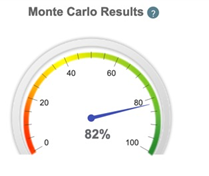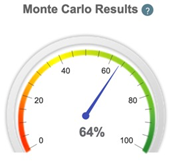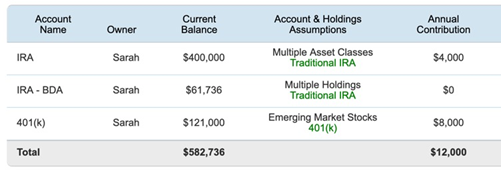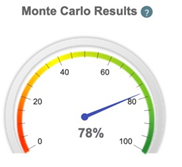Key Points:
- Life insurance can be a key part of a financial plan.
- Just knowing that an insurance payout would be there in case of an unexpected loss can alleviate a lot of worry.
- Using a program like WealthTrace can tell you how much insurance you might need to make you financially whole in case of such a loss.
Do you need to purchase life insurance? Do you need to purchase more life insurance?
Life insurance can serve as a crucial tool to ensure financial security for dependents. In times of unforeseen events, such as accidents, illnesses, or even untimely death. Like other types of insurance, it provides peace of mind: You know you have this safety net that could help your family cope with the financial challenges that come with the loss of a loved one.
In this article, we'll delve into when purchasing life insurance might be advisable--and how to figure out how much you might need.
The Backstop
The foremost reason to consider life insurance is of course to provide financial protection to loved ones in the event of the untimely demise of the household's main breadwinner. Life insurance payouts can help cover funeral expenses, outstanding debts, mortgage payments--whatever outlays a family may struggle with otherwise.
Ideally, a life insurance policy should help ensure that a family can maintain its standard of living by acting as a substitute for the insured's income. A policy's death benefit might even provide a regular income stream, mimicking the insured's salary income. And for small business owners, life insurance can be a crucial tool in preserving the legacy of a business and securing the financial future of its employees.
When Tragedy Strikes
In our case study here, we'll take a look at a couple in their late 30s with a teenager in the house. They've saved and largely invested about $1.6 million, and plan to spend $80,000 a year once they retire when they are about 68 years old.
Both adults in the home work. One of them earns a lot more in salary income than the other, and thus does most of the contributing to their retirement accounts.
As things stand, they're in decent shape from a Monte Carlo perspective. If they were to save a bit more money, they could pretty easily get this 82% figure above 90%.

If we model the unthinkable--the mother dying five years out, at age 43--you can probably guess what happens to the Monte Carlo results:

There are a number of things going on here that lead to that big drop. The biggest reason for it is that all of the contributions to retirement accounts disappear. What had been about $12,000 in contributions annually, plus a partial employer match on 401(k) contributions, go to $0.

Social Security also benefits won't be nearly as high as projected if she passes away. Meanwhile, living expenses are only projected to drop by 25% (though this can be modified in WealthTrace), as a lot of costs are fixed (like utilities and the mortgage).
Life Insurance to the Rescue
If we model a half-million-dollar life insurance payout (which, incidentally, is tax-free--yet another great thing about life insurance), the family is close to back on track from a Monte Carlo perspective:

WealthTrace will assume that the proceeds go into the family's taxable investment accounts on a pro-rata basis, so there will be plenty of time for it to compound before retirement.
Useful Later in Life Too
Above is the kind of scenario that often comes up when life insurance is discussed or written about: A young family, in their prime working years, is suddenly without a big breadwinner. Life insurance is invaluable in such a case.
But there's another, less talked about scenario that bears mentioning here as well.
Consider a retired couple that largely relies on fixed income in retirement--that is, Social Security and pension benefits instead of investment assets. The two plan participants have similar Social Security benefits, and one of them has a decent-sized pension with no survivor benefit.
If the person with the pension dies earlier than expected, the survivor could be in a bit of financial trouble. In general, the survivor will be given the higher Social Security benefit of the two. But if the couple really relies on that pension and it suddenly goes away, the survivor will need to replace at least some if not most of it.
In a case like this, a term life policy is probably going to make the most sense. A term life policy guarantees the payment of a so-called death benefit to the beneficiary--if the insured person dies during the term specified. Unlike other life insurance products, term life policies' only benefit is the death benefit. There's no savings component (though you may be able to convert it to a whole life policy, which then would include a savings component). This means that, if the insured does not pass away during the term for which you've purchased the policy (say 10 or 20 years), that money is gone. You pay for the peace of mind, just like you do when you buy house insurance and your house doesn't burn down, and when you buy car insurance and you don't get in an accident.
At Least Give it Some Thought
Life insurance is more than just another financial product. It can serve as a pillar of security that provides protection, stability, and peace of mind. If you have a family and/or a small business and are not independently wealthy, at least considering life insurance is a must. It's an obvious, easy, and relatively affordable way to safeguard a family's financial well-being in uncertain times. Whether it's providing income replacement, managing debts, securing an estate, or ensuring business continuity, life insurance can make a huge difference to a financial plan.
Do you need or have enough life insurance? If you don’t know, sign up for a free trial of WealthTrace to find out and to get started on your retirement planning.